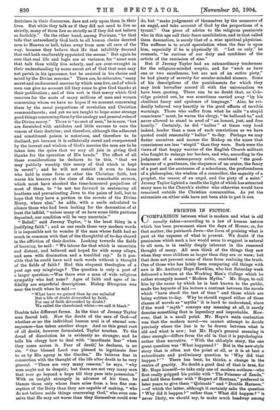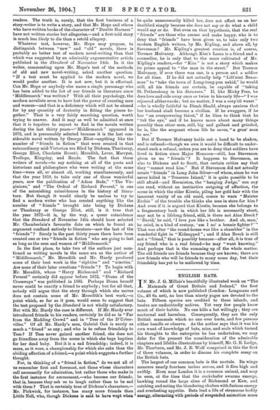C OMPARISON between what is modern and what is old usually
takes—according to a law of human nature which has been permanent since the days of Homer, or, for that matter, the patriarch Jews—the form of praising what is past at the expense of what is present. We doubt if the pessimism which such a law would seem to suggest is natural to all men, is in reality deeply inherent in the reasoned thought of many. All men think of the things they saw when they were children as larger than they are or were; but that does not prevent some of them from realising the truth. One of those who has lately been comparing old things with new is Mr. Anthony Hope Hawkins, who last Saturday week delivered a lecture at the Working Men's College which he rather strangely named " Modern Myths." Mr. Hope, to call him by the name by which he is best known to the public, made the keynote of his lecture a contrast between the novels which "have stood the test of time" and those which are being written to-day. Why he should regard either of these classes of novels as " myths " it is hard to understand, since if the word "myth" conveys any meaning at all, it surely denotes something that is legendary and improbable. How- ever, that is a small point. Mr. Hope's main contention was that the modern novel—we cannot attempt to decide precisely where the line is to be drawn between what is old and what is new ; but Mr. Hope's general meaning is clear enough—differs from the old in that it is psychologica rather than narrative. " With the old-style story, the one great question was ' What happened ? ' But in the new-style story that is often not the point at all, or it is at best a subordinate and preliminary question to ' Why did that happen ?" There has been, he thinks, a change in the centre of gravity. No doubt a good deal of that is true, for Mr. Hope himself—to take only one of modern authors—who first really gripped his public with " The Prisoner of Zenda," and held them faster with " Rupert of Hentzau," preferred in later years to give them " Quisante " and " Double Harness," —of which the latter, although it certainly asks the question " Why did it happen ?" rather than " What did happen ? " is never likely, we should say, to make much headway among
readers. The truth is, surely, that the first business of a story-writer is to write a story, and that Mr. Hope and others who have written books of the character of " Double Harness " have not written stories but allegories,—and a first-told story is much less likely to die than a retold allegory.
Whatever test, however, Mr. Hope may propose, to distinguish between " new " and " old " novels, there is probably no better teat of modern novel-writing than that which was suggested by an admirably argumentative article published in the Standard of November 14th. In it the writer, commenting upon Mr. Hope's test of the methods of old and new novel-writing, asked another question. " If a test must be applied to the modern novel, we would prefer another. It is not new, but it is effectual. Can Mr. Hope or anybody else name a single personage who has been added to the list of our friends in literature since Middlemarch ' was written? With all their psychology, the modern novelists seem to have lost the power of creating men and women—and that is a deficiency which will not be atoned for by any quantity of dexterity in fitting the pieces to- gether." That is a very fairly searching question, worth trying to answer. And it may as well be admitted at once that it is hopeless to expect to find in the novels written during the last thirty years—" Middlemarch " appeared in 1872, and is presumably selected because it is the last con- siderable novel written by George Eliot—anything like the number of "friends in fiction" that were created in that extraordinary mid-Victorian era filled by Dickens, Thackeray, George Eliot, Charlotte Brontë, Meredith, Lever, Marryat, Trollope, Kingsley, and Reade. The fact that those writers of novels—to say nothing at all of the poets and historians and philosophers who were writing at the same time—were all, or almost all, working simultaneously, and that the year 1859, to take only one of those wonderful years, saw the publication of " Adam Bede," " The Vir- ginians," and "The Ordeal of Richard Feverel," is one of the astonishing coincidences in the history of litera- ture. But though it would clearly be useless to try to find a modern writer who has created anything like the number of " friends " brought into being by Dickens or Thackeray or George Eliot, still, is it true that the year 1872—it is, by the way, a queer coincidence that the Standard of November 14th should have selected Mr. Chamberlain's favourite date on which to found an argument confined entirely to literature—saw the last of the " friends " ? Surely in the past thirty years there have been created one or two " friends in fiction " who are going to last as long as the men and women of "Middlemarch."
In the first place, to take two of the authors just men- tioned as writing novels in the same era as the author of "Middlemarch," Mr. Meredith and Mr. Hardy produced some of their best work in the " eighties " and " nineties." Are none of their later creations "friends " ? To begin with Mr. Meredith, whose " Harry Richmond" and " Richard Feverel" certainly did appear before 1872, "Diana of the Crossways" was published in 1885. Perhaps Diana herself never could be exactly a friend to anybody ; but for all that, nobody will argue that the story through which she moves does not contain some of Mr. Meredith's best work,—a point which, so far as it goes, would seem to suggest that the test proposed by the Standard is not wholly satisfactory. But with Mr. Hardy the case is different. If Mr. Hardy ever introduced friends to his readers, certainly he did so in "Far from the Madding Crowd" and in " Tess of the D'Urber- riles." Of all Mr. Hardy's men, Gabriel Oak is surely as much a " friend " as any ; and who is to refuse friendship to Tess ? If Tess never gained another friend, she does not go friendless away from the scene in which she begs baptism for her dead baby. But it is a sad friendship; indeed, it is more, as it were, a championship for which she asks than the abiding affection of a friend,—a point which suggests a further thought.
For, in thinking of a " friend in fiction," do we not all of us remember first and foremost, not those whose characters call necessarily for admiration, but rather those who make in the first instance for amusement,—who become our friends, that is, because they ask us to laugh rather than to be sad with them P That is certainly true of Dickens's characters,— Mr. Pickwick, for instance, has many more friends than Little Nell, who, though Dickens is said to have wept when he quite unnecessarily killed her, does not affect us on her deathbed simply because she does not say or do what a child would say or do. But even on that hypothesis, that the real " friends " are those who amuse and make happy, who is to deny that " friends " have been given us, to take only two modern English writers, by Mr. Kipling, and above all, by Stevenson P Mr. Kipling's greatest creation is, of course, Terence Mulvaney. Although Kim's Lama is a friend and a counsellor, he is only that to the more cultivated of Mr. Kipling's readers,—for " Kim " is not a story which makes its prime appeal to " the man in the street." But Terence Mulvaney, if ever there was one, is a person and a soldier for all time. If he did not actually help "Lift'nint Brase- nose " to "take the town of Lung-tung-pen nakid," he would still, all his friends are certain, be capable of "taking St. Pethersburg in his dhrawers." If, like Micky Free, he does love and ride away once or twice in his early life—" I was rejooced aftherwards ; but no matter, I was a corp'ril want" —he is wholly faithful to Dinah Shadd, always anxious that her husband shall become a civilian. If he swaggers, if he has " an overpowering thirst," if he likes to think that he " tuk the eye," and if he knows more about many things possibly than other men, still, big and gallant and grizzled, he is, like the sergeant whose life he saves, "a gran' man to see."
But if Terence Mulvaney holds out a hand to be shaken, and is refused—though we own it would be difficult to under- stand such a refusal, unless you are to deny that soldiers have lived in fiction since Major Monsoon—still, has Stevenson given us no " friends" P It happens to Stevenson, as also to Dickens and to Scott, that certain critics say that they " cannot read him." But if Stevenson did not actually create " friends " in Long John Silver—of whom, since he was never killed in " Treasure Island," it is quite possible to be still afraid—and Hermiston, the "hanging Judge," can any one read, without an instinctive outgoing of affection, the scene in which the elder Kirstie, piling her gold hair with the innocent vanity of an old maid, comes to warn " Meister Erchie " of the trouble she thinks she sees in store for him P And even if it is argued that Kirstie, because she belongs to a fragmentary book in which her life is necessarily short, may not be a lifelong friend, still, is there not Alan Breck " 'David,' he said, love you like a brother. And oh, man,' he cried, in a kind of ecstasy, am I no' a bonnie fighter ? " That was after "the round-house was like a shambles" in the wonderful fight in " Kidnapped " ; and if Alan Breck is still not a "friend," that is possibly because—after all, it is true of any friend who is a real friend—he may " want knowing." And perhaps that is the summing up of the whole matter. The old friends are friends because they are known; there are new friends who will be friends to many some day, but their friendship has yet to be mellowed by time.
ENGLISH BATS.















































 Previous page
Previous page